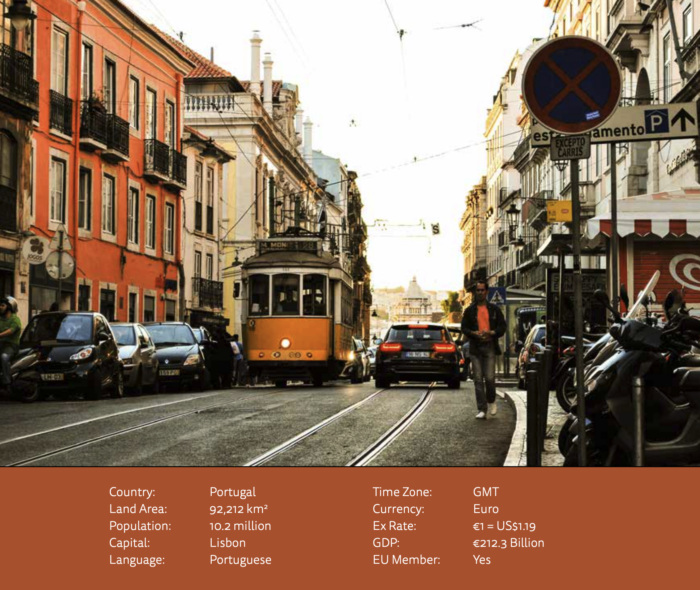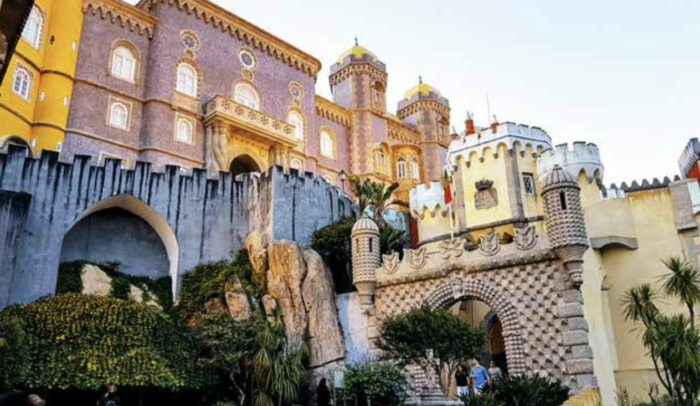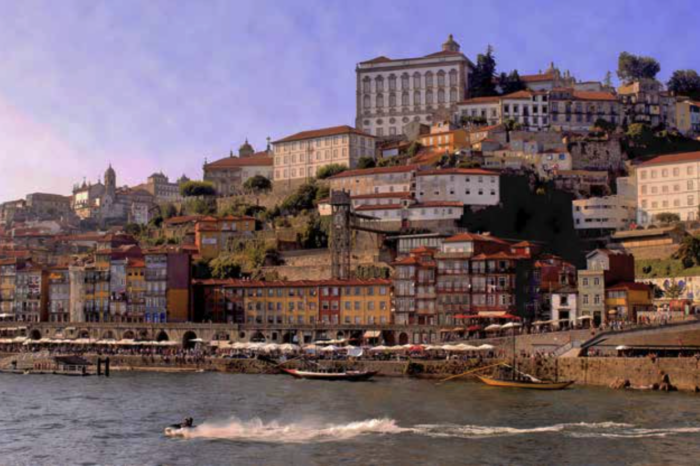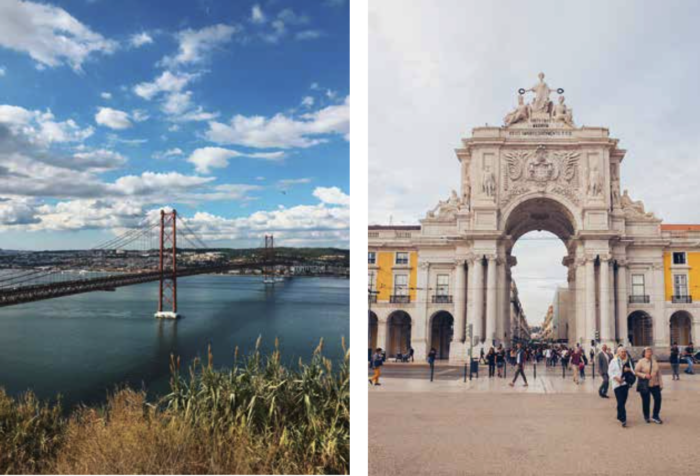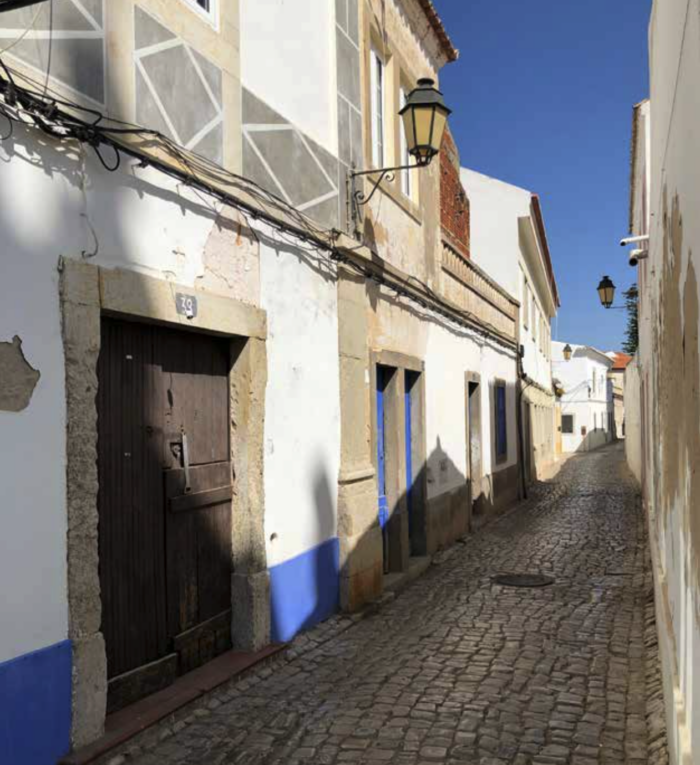Portugal is located on the west side of the Iberian Peninsula next to Spain. As with most European countries, Portugal was invaded by the Romans and occupied until 298 AD. Rumour has it that the Romans named the country after their name for the town Portus Cale which is now Grande Porto.
In 711 AD the Moors invaded and proceeded to conquer the Iberian Peninsula. They would hold on to some portion of the area for hundreds of years, but the Christian nations began to push them back and eventually drove the Islamic Moors from the Peninsula altogether. This effort took hundreds of years.
In the 14th century, Portugal became a major power in the Age of Exploration. Portuguese explorers such as Vasco da Gama, Pedro Álvares Cabral and Fernão de Magalhães began to build Portugal into a vast colonial empire. Colonies were set up in South America, Africa, and the Far East.
In 1932, Dr. Antonio Salazar took power, ruling as a dictator. After him, Marcelo Caetano ruled Portugal but in 1974 there was a left-wing military coup, and they made drastic democratic reforms including granting independence to all of Portugal’s African colonies.
Portugal was a founding member of NATO and is a member of the European Union.
Principal Industries in Portugal
Portugal’s main industries include textiles, footwear, wood pulp, paper and cork.
Other Important Industries
Agriculture, wine, tourism, electronics, communications, rail and aerospace equipment are all vital secondary industries for the Portuguese economy.
Doing Business in Portugal
As an EU member, located on the westernmost part of the Iberian Peninsula, Portugal offers a local market of 10.3 million people and tariff free access to more than 500 million. It also has excellent trade links across the European continental network and across the Atlantic, making it a massively strategic location for companies that wish to expand beyond multiple borders.
Rather than a hinderance, the global economic crisis provided a wakeup call for Portugal and after a period of fiscal stagnation, the government was forced to act. By changing a number of financial policies, Portugal was able to recover far quicker than many of its neighbours and actually ended up surpassing EU growth predictions. At present, with an upward economic trajectory, Portugal consistently scores highly on the World Bank’s “Ease of Doing Business” reports and offers one of the lowest operation costs in western Europe.
While the business culture in Portugal is formal, the Portuguese people are generally very warm and friendly, so expect hospitable introductions. Indeed, even the country’s corporate affairs remain primarily relationship based.
You can find more information on forming and maintaining these business relationships when doing business in Portugal through the World Business Culture website.
The View from the Ground
When describing a country and its culture, you can write down all the facts and figures you like but if you want the full story, you need to get the perspective of someone with a lived experience
of being there. That’s why we’ve asked Aníbal to give us his take on what it’s like to live and work in Portugal.
A former president of Portugal once said, “Portugal is a country that is light on customs.” And, in a way, he’s right. 50 years ago we had a revolution without a shot being fired. It was very civil. We’re a pretty laid-back people and don’t like to take things too seriously. So, with that in mind, I don’t think there’s anything that could happen in a meeting which would offend our sensibilities or traditions. I suppose there are some old people who are stuck in the past and will insist on being referred to by their title such as Doctor or Professor, but they are few and far between. They are from the old school when companies used to have strict hierarchies but that doesn’t happen now. Now, even the owner will get called by their first name and the structure is very flat. Also, the younger generation does not act this way at all, and certainly not in tech. Most tech companies have a strict dress code of jeans and a t-shirt. Having said, that I’ve worked at places where some customers would expect you to wear a tie.
Another thing that’s very relaxed is setting up meetings. You don’t really need a network in Portugal. It’s not that difficult to get hold of people most of the time. Obviously, if you know a guy who is the next-door neighbour of your prospect, that’s going to make things easier but by and large, people will answer phone calls and they will reply to emails, so it’s not a massive challenge.
In terms of the meeting itself, you’ll find that Portuguese people are usually very nice, so they don’t put any barriers in your way. In fact, what they’re trying to do is build bridges to see if there’s a business fit. The one downside of them being nice and polite though is that if they’re not convinced or they’re not interested, they won’t tell you. So, they have that indirect communication style that may waste your time. Then, worst of all, they ghost you. You can try to reach them by phone, and they don’t pick up, and emails go unread. What they don’t realise is that in this business, we’re not going to get upset if you say “no.” It’s not personal, it just wasn’t the right fit today.
The pace of business isn’t super-fast but it’s probably faster in the tech sector than any other. It would be possible to strike a deal within three meetings for sure. Normally of course, the person who needs the product and the one who needs to sign off on it are not the same person, so sometimes, delays can occur there. Sometimes, the complexity of the product can be an issue as well. With a more complex product, they may want to test it for longer, but if it’s clearly a plus for the company, it’s not difficult to do a deal. Of course, I’m talking about the private sector as the public sector is a totally different animal. The public sector takes so long to pay that they’re actually a liability. It could take anywhere from a year to three years for the contract to be paid out. So, what’s happened is that companies hike up the price because they need to do some factoring with a bank or something like that, so it’s terrible to do business with the public sector.
We have a number of unicorns in Portugal including a mobile app developer and a fashion e-tailer that have been massively successful, but the number of start-ups isn’t as many as you’d hope. We have a bit of a problem here with “brain drain”. We produce world-class engineers in Portugal. Everybody knows that and Lisbon University is doing a wonderful job. The problem is that because everybody knows the engineers here are world-class, everyone wants them and they leave. They go to the USA, the Netherlands and Germany mostly. Actually, I personally
know two very good engineers who work in Portugal. But guess what? They’re working remotely for two German car companies.
It’s not too easy to start a business in Portugal due to some government policies and the tax system. This is the reason that some Portuguese companies are headquartered in other countries, just because of the tax. It also explains another reason why our talent chooses to work abroad rather than stay and build a start-up. Of the companies that are able to scale though, most try to enter the Dutch market.
In terms of any sort of rivalry, it would have to be Spain. They’re the ones we always want to beat at football. Neighbours are always like this. Don’t forget that in the 17th century, Portugal and Spain divided the world between themselves with Portugal getting Brazil. And, who is Brazil’s biggest rival? Their neighbour, Argentina. Most of this rivalry with Spain thing is just for fun though. We don’t really mean it and it doesn’t affect trade at all. We also get on well with England, which has to do with the history of royal marriages between the two countries. And of course, the Brazilians are our very good friends with lots of trade and lots of immigration going both ways.
We do have a bit of difficulty dealing with the French though. In the 1960s, there was a lot of immigration from Portugal to France and the Portuguese found it very difficult to get jobs. So, the women largely ended up cleaning people’s houses and the men worked in construction. These people were very poor, and the French hold the attitude that the Portuguese are only good for menial jobs.
Portugal used to be a very religious country but not anymore. Not like it was before anyway, perhaps more so among the older generation. Definitely not like it is in Spain. We still celebrate Christmas though and that’s very much a family thing here although there will also be an office Christmas party. People celebrate Easter too but that’s when they start going to the southern beaches as the weather starts to improve. The calendar might say it’s a religious holiday but to most people, it’s just a holiday.
We’ll also celebrate a birthday in the office with a cake or something and perhaps a drink after. But, what the Portuguese love more than anything else is lunch. They’ll take one and a half, two hours for lunch. They’ll work a little later to make up the time, but nothing should get in the way of lunch. With this of course, you end up being friends with your colleagues. This means of course, that you will also see your colleagues outside of work. So, say it’s a Saturday and one of your colleagues is having a barbeque, he’ll invite his workmates for sure. The Germans like to separate their work life and home life completely, but we are much more integrated. As an example, I still have connections with people from a company I left in 1995. We network together and we have a website where we can refer a friend or put up our children’s resumes. We’re all still very close and try to have a reunion every year or two. So yeah, it’s very easy to get on with Portuguese people and easy to make friends, even if you’re not from Portugal.
We also like to have a laugh in the office. Typically, we tell a joke like, a German, a Brit, a French and a Portuguese guy go into a bar… and then, you tell your story and at the end of the punchline, the Portuguese guy is the hero. He’s not always the hero for the best of reasons by the way, but he comes out on top so he’s the hero.
Lastly, I just want to tell you about something that is so Portuguese, it should be on the flag. Procrastination. You cannot get a Portuguese to do something today that he can put off until tomorrow. Even if you’ve got an expo that is like 5 months away, everyone will try to register on the last day. It’s always like that whether you’re paying your taxes or whatever, everyone will always try to do it on the last day or in the last hour. Sometimes, the government has even extended deadlines to get something done because if you are doing it online, the system can get blocked with everyone trying to do it at once.
Business Etiquette
Timekeeping and punctuality are not massively important to the Portuguese, and it is only really the host who is expected to be on time. Participants could be up to twenty minutes late without anybody getting annoyed but if that participant is you, it’s always polite to call and let your host know.
As far as business attire goes, the Portuguese are very fashion conscious and are aware of the latest trends. Consequently, you will need to consider your appearance more carefully when approaching a Portuguese prospect. It’s unlikely that you’ll need to wear a suit, you should probably aim for business casual.
As with timekeeping, you may find the pace of the deal is a little more relaxed than you are used to. This is not in any way meant to be an offence but is actually out of respect for the relationship which is an important part of business deals in Portugal.

